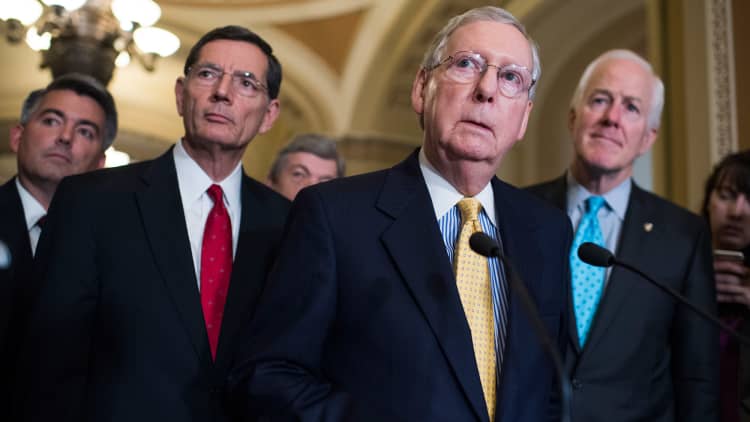
The U.S. Senate's Better Care Reconciliation Act keeps all the provisions from the House of Representatives' health-care bill that increase the benefits of health savings accounts.
"We are delighted to see that the expansion of HSA contribution limits, the lowering of the penalty for non-medical use, and all other provisions in the House bill were left intact for the Senate version," said John Young, senior vice president of consumerism at Alegeus, a technology firm that helps companies offer HSAs to the market.
HSAs, introduced in 2003 during President George W. Bush's administration, offer you triple tax advantages: First, contributions are tax-deductible. Second, those contributions can be invested and grow tax-free. Third, withdrawals aren't taxed as long as you use them for qualified medical expenses, such as doctor's visits, prescription drugs and dental care.
"It's [the] best tax-advantaged vehicle to save for medical expenses and for other expenses in retirement," Young said. For example, while 401(k) plan contributions are subject to the FICA tax, which funds Social Security and Medicare, the money you put into an HSA is not.
The Senate and House bills make HSA rules more flexible by:
- Allowing both spouses to make catch-up contributions to one HSA beginning in 2018.
- Permitting qualified medical expenses incurred before HSA-qualified coverage begins to be reimbursed from an HSA as long as the account is established within 60 days.
- Letting people use their HSAs to pay for over-the-counter medications, which was restricted under the Affordable Care Act.
- Lowering the tax penalty if you use an HSA to pay for unqualified medical expenses to 10 percent, from 20 percent. (If you're 65 or older, you can withdraw from an HSA penalty-free, but you do not get a tax break if you use the money for something other than health care.)
"These changes are welcomed by employers," Shandon Fowler, senior director of employer portfolio strategy at benefits administrator Benefitfocus. "Overall, they give employers more flexibility to drive employees to make the best choices for themselves and their families."
A drawback of HSAs is that they must be paired with a high-deductible health plan. Such a plan means you'll have to pay a deductible of at least $1,300 for individual coverage and $2,600 for families. The maximum annual out-of-pocket costs for these plans are $6,550 for individuals and $13,100 for families this year. Next year, those maximums rise to $6,650 for individuals and $13,300 for family coverage.
In 2017, you (and your employer) can contribute up to $3,400 to an HSA for individuals and $6,750 for families. Account holders age 55 and older can contribute an extra $1,000. Next year, under current law, you can contribute up to $3,450 for individuals and $6,900 for families.
The Better Care Reconciliation Act proposes increasing the annual limit on HSA contributions to match the annual deductible and out-of-pocket expenses under a high-deductible health plan. That means the HSA contribution limit could be at least $6,650 for individuals and $13,300 for families beginning next year.
HSAs continue to grow
The adoption of HSAs and high-deductible health plans is growing regardless of what Congress is doing.
Roughly 60 percent of large employers offer an HSA-compatible health plan to workers and half of the employees enrolled in those plans use an HSA, Benefitfocus' Fowler said.
HSA users fall into two distinct groups, Fowler said: Those who can afford to save with the tax-advantaged accounts and pay their health expenses and low-income workers who struggle to have enough money to put into the accounts.
HSAs have grown to an estimated $37 billion in assets and 20 million accounts at the end of last year and reached $41 billion in assets during January, according to Devenir, an HSA consulting firm in Minneapolis.
Given the momentum, Devenir forecasts assets in the accounts could reach more than $53 billion by 2018, a 20 percent increase from this year. (See chart below.)
How to pick an HSA
You don't have to wait on Congress to open an HSA.
Unlike flexible spending accounts, you don't have to "use it or lose it" with an HSA each year. Around a quarter of HSA owners don't touch any money from their accounts, according to Fidelity.
Your employer may direct you to sign up with its preferred HSA provider, but if you are enrolled in a qualified high-deductible health plan, you can choose whatever provider you want. However, if employers only offer matching HSA contributions to their preferred provider, it makes sense to stick with them.
Given the tax advantages, HSAs should be a key part of your retirement savings strategy, said Young at Alegeus. He recommends that people save in a workplace retirement plan up to the employer match, then maximize their HSA contributions and put any remaining savings in 401(k) plans or other investment accounts.
Devenir estimates that about 10 percent of the roughly 20 million HSA account holders have a balance of $5,000 or more and 4 percent of people are using their HSAs as investment plans. Many HSA providers require that you have at least $1,000 in your account before you can invest.
How should people invest their HSA money? Generally, you should have enough cash in your HSA to cover expected medical expenses and invest the rest, according to Fidelity. Here are some portfolio guidelines Fidelity uses for its HSA account holders based on age:
HSAs can travel with you if you change jobs or insurers. Use HSASearch, which is run by Devenir, to comparison shop for more than 320 providers. As with any retirement account, fees and investment options matter.
If Congress increases the benefits of HSAs, it will be helpful to savvy savers, but may not do much for the uninsured.
"HSAs are not a fix for the health-care system or the lack of health literacy in this country," said Young.


